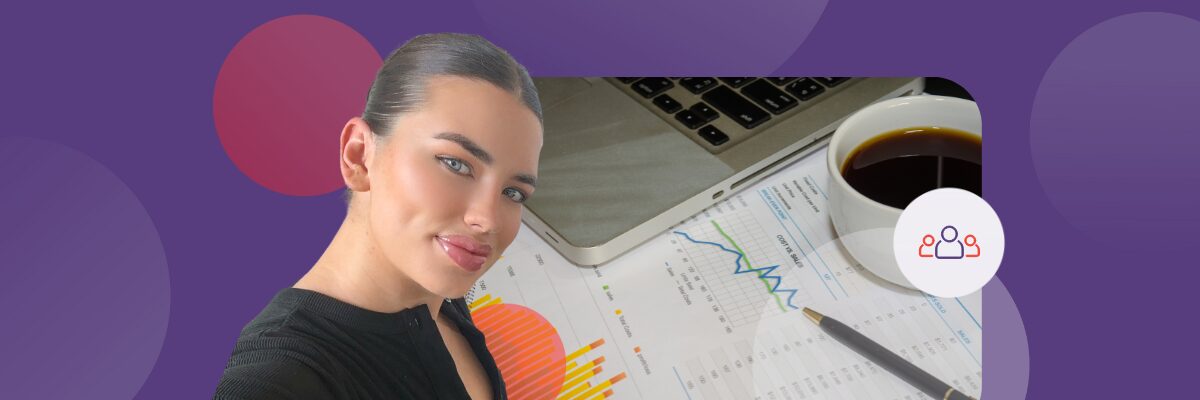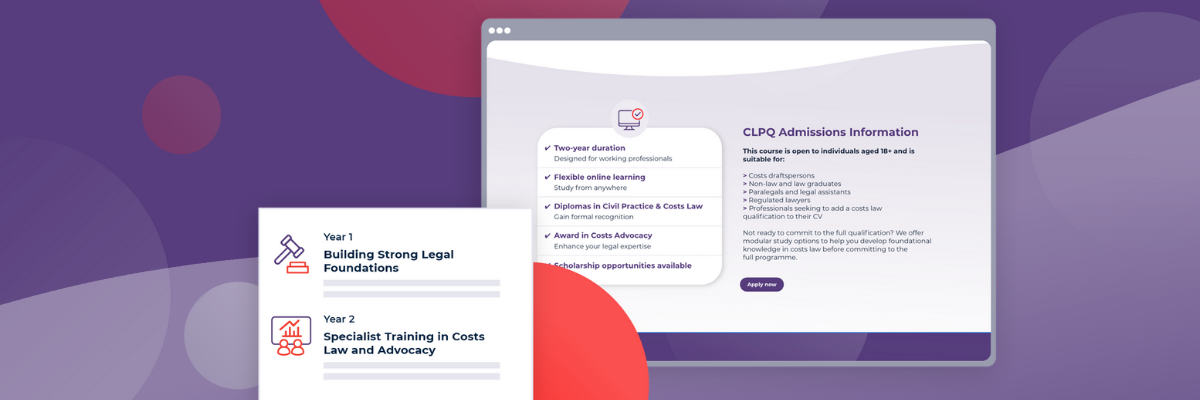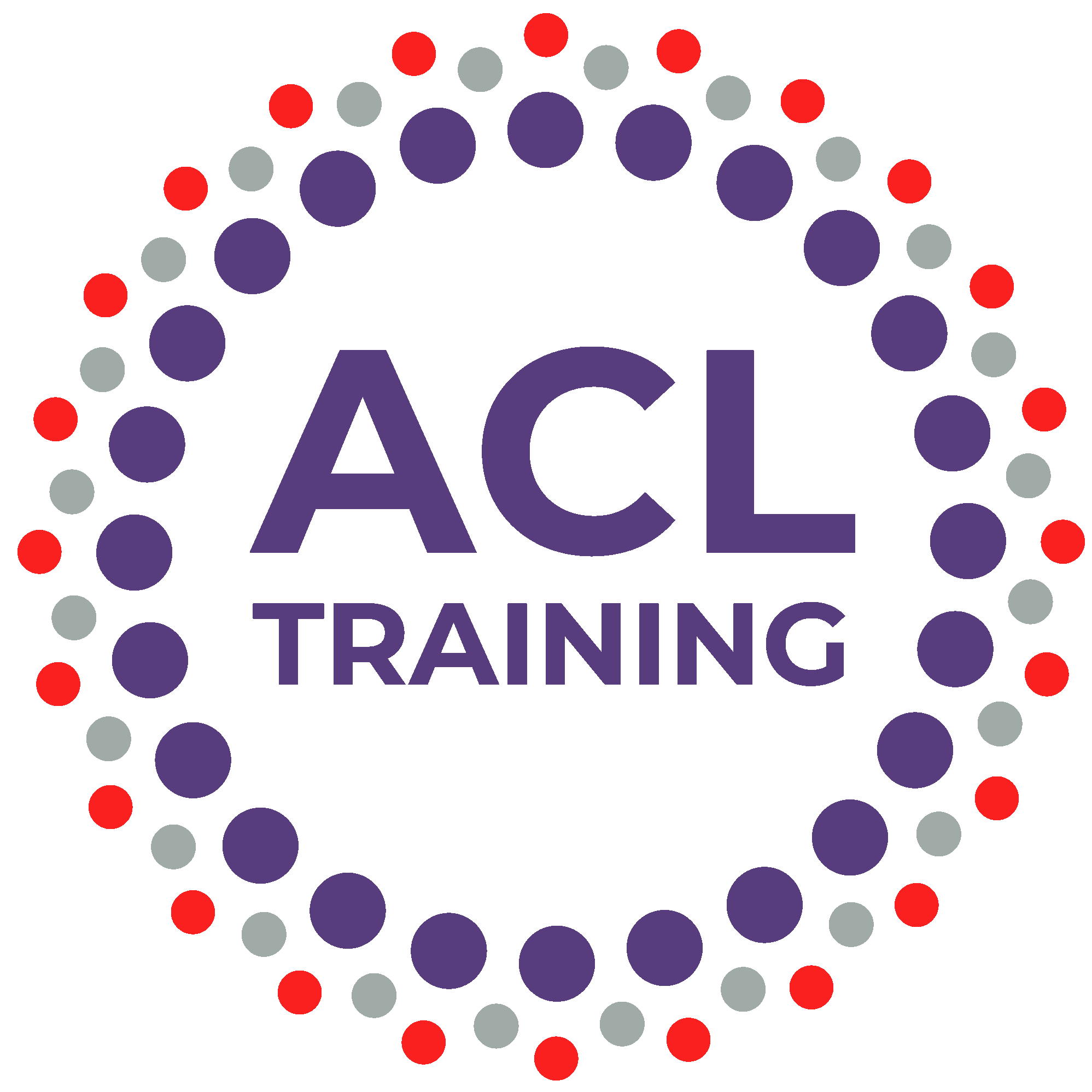A Year into the CLPQ: Lessons, Challenges and Real-World Wins

Twelve months ago, Sarah Jane Lewis shared why she chose the Costs Lawyer Professional Qualification (CLPQ), giving us a glimpse into the early stages of balancing work, study, and ambition.
Now, a year in and halfway through the course, she’s reflecting on how the past year has shaped her skills, confidence and career direction.
In this Q&A, Sarah Jane speaks candidly about what it really takes to study while working and how the course has already paid off – personally and professionally. Offering valuable insights, from managing time and applying learning at work, to staying motivated and finding support in the course structure.
Let’s get into it.
Q1.How has your role evolved since starting the CLPQ, and what new responsibilities or opportunities have emerged as your knowledge has deepened?
Since starting the CLPQ, my confidence in my work has grown significantly — and so has my enjoyment of it. I already loved what I did, which was one of the main reasons I enrolled on the course, but now I feel even more passionate about it and far more confident in my ability to deliver strong results for clients.
That growth has already started to pay off. In March 2025, I secured a role at a highly reputable costs firm, Paramount Legal Costs (soon to be Peak Costs), which marks an exciting new chapter in my career. I’ve also started to build valuable connections within the industry and have begun developing my personal brand, laying the foundations for a career I’m genuinely proud of.
Q2. Balancing study with full-time work and personal life can be tough. How have you managed your time and energy, and what strategies have helped you stay motivated?
I can sit here all day and say “you’ll be fine” or “you can do it, it’s easy” but the truth is, everyone’s circumstances are different, and I’d be lying if I said this qualification was super easy. But that’s exactly why those who choose this path are so good at what they do. The time, effort and discipline involved in becoming a Costs Lawyer is not to be underestimated.
I’ve had to be realistic about my available hours and I’ve dedicated weekends and some weekday evenings specifically for study that work for me personally.
Some weeks I feel like I’ve got all the time in the world and I can really get stuck into my assignments. Other weeks are a whirlwind working a full-time job, home responsibilities, personal commitments and making sure I’m looking after both my physical and mental health. There have been moments where I’ve had to stop, listen to my body, and just take a break. I’m no good to anyone (or myself) if I’m burnt out.
To manage things better, I started waking up that little bit earlier in the mornings to get a head start on the day. I also have a few non-negotiables in my week: dinner with family, gym sessions, and time with friends. Those things help me feel grounded and give me the energy to keep going when things get intense.
Staying motivated hasn’t always been easy, but what keeps me going is the long-term goal: qualifying as a Costs Lawyer and advancing in a career I’m passionate about. When motivation dips, I reflect on how far I’ve come (especially as I never went to university and I have worked from the ground up) and the practical skills I’m building with each assignment. Reminding myself why I started helps me push through even when the balance feels off. It’s not about being perfect every week, it’s about showing up consistently, even if some days that just means doing what I can.
Q3. Which parts of the course have been most useful in your day-to-day work? Can you share any examples where your learning directly influenced a case outcome or added value for a client?
I have loved each part of the course and I have been faced with new challenges in each module which have allowed me to incorporate skills into my day job such as communicating with clients better and drafting bills to a higher standard . Currently, I am working on the Costs Advocacy module which is hands down my favorite to date. It has helped me gain confidence speaking in front of people and even helped me with how I present myself. I have even noticed that my speaking skills have improved (not over complicating things/being clear) and my listening skills.
Q4. Remote working and distance learning both come with pros and cons. How have these shaped your CLPQ experience, and what have you learned about staying connected and supported while studying?
Distance learning has allowed me to fit studying around my full-time job, which would have been really difficult with in-person attendance, especially now that I live in rural West Wales. I’ve been able to manage my time independently and tailor my study routine to what works best for me. Not having to commute is a big plus too! The time I would’ve spent travelling has
often already been used to get studying done and logged off for the day, so in that sense, it’s definitely helped me save time.
Each week, our group meets online for live sessions where we go through the modules together with our tutor. Having that weekly interaction has helped things feel less isolating and gives us the chance to ask questions as we would in a classroom. Some of the students have also set up a WhatsApp group, which has been a great space to share questions or support each other when we get stuck.
To stay connected and supported, I’ve learned that being proactive really makes a difference, whether that’s reaching out to tutors early, getting involved in group chats, or making the most of the online resources. I’ve also found that building a regular routine and setting aside dedicated study time has helped me stay focused and avoid burning out.
Overall, the experience has taught me the importance of self-discipline, communication, and staying connected even when working remotely. These are skills that I’ll definitely take with me into both my studies and professional life.
Q5. How have tutorials and group discussions added to your learning? Any light-bulb moments from hearing peers’ perspectives?
The group discussions and tutorials have really helped me look at things from different angles. Sometimes someone will ask a question that hasn’t even crossed my mind, and it makes the material click in a new way. Everyone in the group works in different areas and has their own roles in their day jobs, so it’s been useful to hear how they approach things. It gives a much broader perspective.
There have definitely been a few light-bulb moments where I’ve thought, “Ah, I get it now!” Hearing how someone has actually applied a concept in real life makes such a difference, it’s completely different to just reading about it in theory.
Q6. Has your career outlook changed since starting the CLPQ? Are you thinking differently about your future goals, or possible specialisms?
Yes definitely! Since starting the CLPQ it has made me think more clearly about what direction I want to go in and what areas I enjoy the most. Some of the modules have opened my eyes into the specific specialist areas I hadn’t thought of, even areas I never thought I’d enjoy but I’ve loved. It’s given me confidence and structure as to where I want to be in future.
It has also allowed me to think more seriously about my long term goals. Not just qualifying but what I want to be doing day to day, what my strengths are and what kind of cases I would like to be dealing with. So yes, it has definitely shifted my thinking and helped me to finally answer the classic question ‘’Where do you see yourself in 5 years’’.
Q7. You’re currently studying the Costs Advocacy module; how are you finding it so far, and have you had any early opportunities to apply what you’re learning in the real-world?
As part of the advocacy module on the Costs Lawyer course, I recently completed my in person costs advocacy assessment and it has been the highlight of the course for me so far. The entire experience was not only incredibly valuable, but genuinely enjoyable and affirming.
The morning session was a fantastic learning opportunity. I undertook a Detailed Assessment hearing of a complex bill of costs, responding to Points of Dispute and engaging in live negotiation in front of a Costs Judge/experienced barrister. The level of realism made it an excellent training ground. I gained so much from observing the practical application of the rules and procedures in real time, as well as receiving feedback directly from those with years of courtroom experience.
In the afternoon, we completed our formal assessment. I appeared as the Defendant in a complex Part 35 application hearing, and I’m pleased to say it went very well. We presented the outcome of our negotiations and addressed the draft order, explaining the positions of both parties and responding to judicial questions.
What really stood out to me was how the experience shifted my perspective: while advocacy can feel daunting, it’s also hugely exciting and rewarding. The Costs Judge was encouraging, professional, and reminded us that judges are real people too, they’re not looking for perfection, but preparation, confidence, and clarity. That realisation made the entire day even more enjoyable.
This module has been my favourite by far. It truly resonates with me and aligns perfectly with my strengths and personality. I’ve found it engaging, energising, and an excellent opportunity to develop both listening and speaking skills, particularly in the context of hearing preparation, legal argument, and effective negotiation.
Looking back, this experience has confirmed something important for me: I now know exactly what I want my career to look like. Advocacy is not just a skill I want to refine but it’s a part of my future.
I know this module was daunting for many and speaking in front of judges or other professionals can be challenging. I was nervous, but I also learned that nerves are good and it means you care! The nerves quickly go away once you see how the individuals conducting the module only want the best for you.
Are you inspired?
Our thanks to Sarah Jane for sharing her experience. Her story shows how the Costs Lawyer Professional Qualification can be both demanding and rewarding; offering practical skills, deeper understanding, and career momentum, even while you work.
If you’re considering the CLPQ or want to learn where this regulated career path could take you, we’re here to help.
To find out more about the Costs Lawyer Professional Qualification – email: [email protected]
Related Articles

Qualifying as a Costs Lawyer: Recognition and Regulation
If you’re considering a career in law and want a role that blends litigation strategy, financial management, and client impact, qualifying as a Costs Lawyer could be the path for you. The Costs Lawyer Professional Qualification (CLPQ) offers a clear route into a regulated profession that plays a vital role in the justice system. Thinking […]

How to Apply for the Costs Lawyer Professional Qualification (CLPQ) in the UK and What You Need to Know Before You Do
Thinking about a legal career with impact, flexibility and progression? The Costs Lawyer Professional Qualification (CLPQ) could be your ideal route. This guide explains how to apply for the CLPQ, covering eligibility, course content and the benefits of qualifying as a regulated Costs Lawyer in England and Wales. In today’s legal landscape, costs law is gaining new visibility. […]

Balancing Study and Work – How to Stay on Track While Training as a Costs Lawyer
Balancing a full-time job with studying for a professional legal qualification is a significant challenge. For many people working toward the Costs Lawyer Professional Qualification (CLPQ), the course is just one part of a busy timetable – with work deadlines, personal commitments, and often financial responsibilities all running in parallel. The CLPQ is structured as […]
